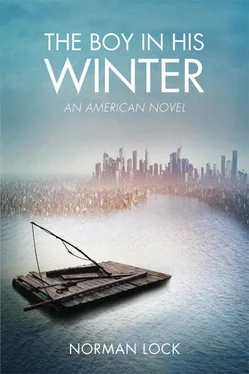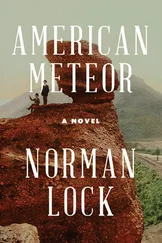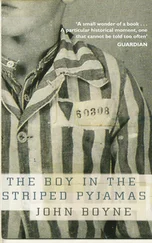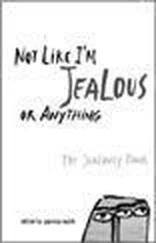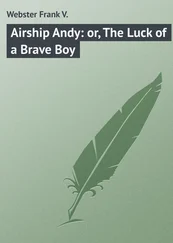“You took your time,” he said.
What a funny expression! As though time were mine or anyone else’s to take.
James paid the cashier. I dumped my old clothes and shoes into a plastic bag. On the street, James looked his old self once more. Jaunty and swaggering, he walked briskly toward his Sophie.
Edgewater Gardens had neither water nor gardens, although there was a dusty palm tree whose roots had lifted and cracked the sidewalk during the hurricane; and there were bushes full of birds I heard but never saw. We went inside the brick building, climbed to the second floor; James knocked on a door, and in a moment Sophie opened it.
“Are you my dad?” she asked ingenuously.
“I am,” he said, unsure of what to do with his feet except to shuffle them in the dust.
The girl’s mother appeared in the doorway, wiping her hands on a towel, which smelled of shrimp.
“Come on in!”
If James had worried about his welcome, he needn’t have. She — her name was Camille — smiled warmly at him. Her skin made me think of copper and syrup. A bruise-colored butterfly hovered where her ample breast began to swell above the halter top. When she smiled at me, I saw she had a “valentine tooth” like James’s. Perhaps in Trinidad, troths were pledged with gold-clad teeth instead of rings. I looked at her hand; she wore a cultured pearl on her finger, but not a wedding band. I don’t know whether she and James were married. I never asked.
We went into the kitchen and sat, without a prelude of drinks, peanuts, and small talk in the living room. Without asking, she ladled peppery jambalaya into our bowls. We ate and talked all at once. Afterward, she carried the dirty bowls into the kitchen, singing a Calypso song, while James poked foolishly at the girl, who laughed. Camille brought us more beer. The ice-cold bottles sweat and beaded; the bent bottle caps made a pleasant heap. Sophie got up on her toes and danced. I said little. What did I know of this life?
“I’ve got a present for you,” James said, giving the girl the package he’d lugged all the way from the boat.
She tore the pink tissue paper from a walnut music box.
“Take it into the front room to play with,” he said. “Mr. Albert, you go with her.”
I followed Sophie into the living room while James led Camille into her bedroom.
The box unfolded into a stage for a tiny ballerina painted gold. Sophie wound a key, and the little figure danced one half of a Tchaikovsky pas de deux, her body reflected in a suite of mirrors. Sophie and I lay on the floor, her chin resting against her palm, my cheek against my arm. I couldn’t take my eyes from the golden figurine turning in the row of mirrors, lit by an accidental slant of light that had traveled across a gulf of space as if with no other thought than to make my eyes grow heavy, my eyelids droop and close until I’d fallen into a trance.
Tom Sawyer had told me how, in a St. Louis music hall where an uncle had taken him and Sid for a birthday treat, a mentalist in a stovepipe and black frock coat tried to hypnotize him with a gold watch twisting on its chain in a sickly light cast by gas brackets. Tom was a difficult subject, he told me proudly on his return to Hannibal, able to resist the power of suggestion. Unlike my old friend, I have always been susceptible to another’s will.
Sophie was telling me how pretty the apartment was — all lit up with candles during the storm — when I fell asleep on the floor. Was it sleep? It reminds me of what used to happen to our minds when, as boys, we’d breathe deeply into a paper bag: Our eyes would go dark and sting, and we’d swoon.
“Do you want to see my titties?”
Becky Thatcher was undoing the buttons of her blouse.
“You’re Tom’s girl! Get away from me!”
“Albert! Albert, you’re dreaming!”
Somebody was shaking me. Tom. Tom, it wasn’t my fault — it was Becky’s doing.
“Wake up, Albert!”
I opened my eyes, to see Sophie kneeling next to me. Her blouse was buttoned. I’ve never been sure if it was she who’d wanted to show me her breasts, or Becky. Embarrassed by the knot of lust in my pants (Tom used to call it a “woody”), I ran outside. Night with its mockery of stars had begun to sift down over the town. I made up my pipe and smoked, wondering what it was, exactly, that James was doing to Camille and she to him. And all the men and women lying together under the roofs of Panama City (the wrecked roofs covered with tarps to keep out night and rain) — what was it that made them search one another out with their mouths and hands? Was it love or desire, human need or only fear?
“You all right, Mr. Albert?” James asked, sitting on the curb next to me.
The street was pitch-dark; the streetlights had not been restored since the storm, which had blown into me its turmoil and noise.
I nodded yes, mutely, in case my voice should shake.
“You know, Mr. Albert, this trip we’re making — it’s not good for you. They’re using you, those Connery boys. You’re part of a plan, Albert, to make us all look innocent. Do you know why we’re going to Atlantic City and why we stopped here? We’re delivering mail: marijuana, grass, doobie, weed, bud, cannabis, Mary Jane, kryptonite — call it what you like. The brothers thought a boy on board would make excellent camouflage. Edgar’s smart. He figured the best time to run the stuff from Mexico to AC was right after a big hurricane. Coast Guard, cops would be busy looking after people who lost their homes. They’d have New Orleans and the levees to worry about. We crossed over from Tampico and slipped into a bayou near Port Eads just before the storm broke. We hitched the boat nice and snug to some big trees; the boys knew how to do it so she’d ride up on the surge without breaking up. Then we hunkered down inside an old cinder-block garage and waited it out. Afterward, it was like Edgar said: chaos and confusion. He’d everything figured, except his brother. I’m scared something bad’s going to happen, Mr. Albert, and I don’t want you getting hurt.”
I listened quietly, taking comfort in the smell of cherry smoke and the pipe’s taste of toasted corn cake. The stars hung over us like a spider’s silver web. I could hear, behind me, Zydeco music playing from the window of Camille and Sophie’s apartment. The moment was too rare for me to contemplate the brothers’ treachery.
“I’d like you to stay here, Albert.”
“Here?” I said, pausing in the contemplation of a cloud of tobacco smoke, which, instant by instant, was reconciling its contrarieties.
James nodded and went on. “I’ve asked Camille to take you in, and she’s agreed. She’s a good woman; she’ll treat you like her own. You can grow up with Sophie — live like an ordinary boy.”
Like an ordinary boy. .
“Would you like that, Mr. Albert?”
I looked at James as Mary must have at the angel Gabriel. Can you imagine what his words meant, the altered life he’d organized and invoked? My resentment flared, but I dampened it at once. I realized this was not the moment for Roman candles of self-important rage. This man James had shown me what the world considers love. I cursed Pap for his folly in making me without it. Spellbound by his idea, James did not notice my mood’s alternations of light and dark. I drew on my pipe, blew another cloud, took it out of my mouth, and smiled my earnest thanks at him. But I was not ready to be civilized.
“I’m sorry, James,” I said.
He was a man of little education, but his apprehension was enormous. Like that other, older James, he had sensitivity, which Hannibal had considered an exclusive property of the well-bred and the well-to-do. Out of respect for my feelings, James never mentioned his glorious plan for me again.
Читать дальше
